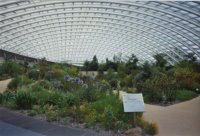
This is the fourth in a series of "parables retold", stories of Jesus retold to fit how I see modern people practicing their religion. Jesus told this parable about a farmer sowing seed. It’s the most important parable he ever told, for in it, he said, was the secret of all parables. In the parable, the soils represent people and the seeds represent God’s words. Here is the parable as Jesus told it, followed by a sort of second chapter...
Listen! A farmer went out to sow his seed. As he was scattering the seed, some fell along the path, and the birds came and ate it up. Some fell on rocky places, where it did not have much soil. It sprang up quickly, because the soil was shallow. But when the sun came up, the plants were scorched, and they withered because they had no root. Other seed fell among thorns, which grew up and choked the plants, so that they did not bear grain. Still other seed fell on good soil. It came up, grew and produced a crop, multiplying thirty, sixty, or even a hundred times.
But the farmer wasn’t satisfied with these results. Scratching his head, he wondered why he couldn’t get all his seed to grow. He said to himself, “Every seed is good, and every soil deserves a chance to receive it.”
The first thing he set out to do was kill all the birds. “The birds shouldn’t enjoy the benefits of my seed. It’s for the soils. I own this seed, and I only want it to build up my kingdom.” So in his traps he gathered and slew the birds.
The next thing that vexed him was the rocky places where there wasn’t much depth to the soil. At first, he decided to pre-qualify the area and scatter seed only where there was a high degree of soil receptivity. But then he thought, “No, I shouldn't have to put up with rocks." So he sent workers ahead to break up all the rocks, softening the soil, so that the roots could grow deeper. And then the farmer made the single greatest leap of progress in agricultural history. The sun was a huge problem for these happy plants with shallow roots. It was hot and uncomfortable when it began to work on them. So he built a huge dome over the soil, ensuring only exposure to a certain amount of light; then he air conditioned it, piped in music for the enjoyment of his garden, watered it year round, and fertilized it with meticulously balanced and perfectly orchestrated nutrients. His servants praised the modern miracle by erecting a marquee reading “Field of Kingdom Dreams / Sowing the Seed in Love”.
But there was still the problem of the thorns, for it seemed that every nice thing he did for the soil to help his seed grow only made the thorns more comfortable as well. He thought to himself, “The thorns are one huge problem right in the middle of my field. Aha.” In another moment of sheer brilliance, he had all the thorns relocated to the perimeter of the dome so that they didn’t crowd or ensnare the saplings in the softened soil, and had the added benefit of keeping trespassers and gleaners out. The thorns provided a virtually impenetrable barrier to his dream garden, preventing access to all but the most desperate.
When all his work was done, the farmer rested, for it was Sunday. Come Monday, it was time to get busy. The farmer took out loans in every bank and borrowed money from every person he could find, selling his dream to expand Gardondom. He set out to reproduce the Dome of Dreams in every nation, every city, every block, every inch of the earth. By the time he was done, there was not a domeless spec of earth in view from land, sea, or sky. It was perfect.
Now go back and read the parable with how Jesus unpacked it for his closest friends (Mark 4:1-20). I wonder what God has in mind for his seed and his soil today.
------------------------------
Copyright © 2005-2006 by Steve Coan
All rights reserved. Written permissions must be secured from the publisher to reproduce any part of this work, except for brief quotations in critical reviews, on-line comments, or articles.

No comments:
Post a Comment